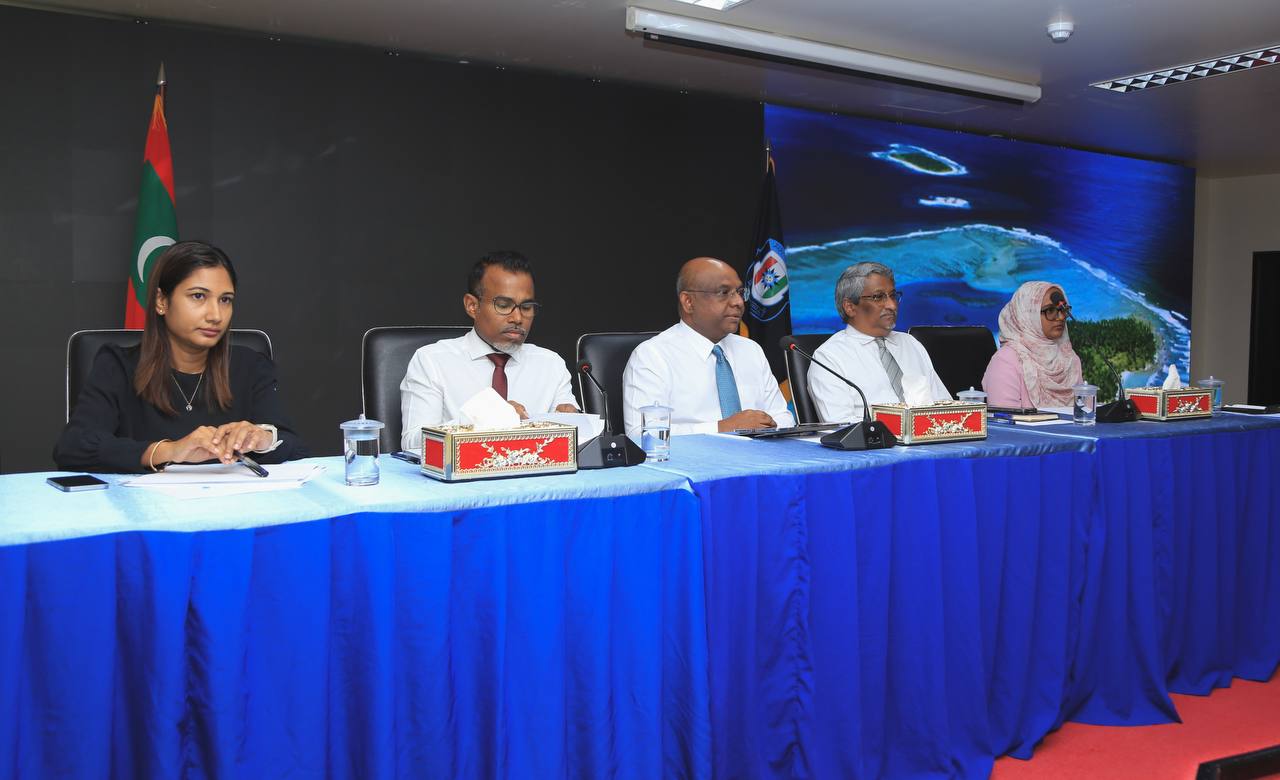Malé, Maldives – A briefing session by the government has been held for Maldives Police Services on the Chagos case.
Foreign Minister Abdullah Shahid and Attorney General Ibrahim Rifath briefed the police on the session.
The session was held following the decision of the National Security Council to brief the Maldivian Police on the ongoing issue between Maldives and Mauritius.
The session was attended by officers from the rank of Superintendent of Police and above, as well as Home Minister Imran Abdullah and CP Mohammed Hameed. Foreign Ministry and Attorney General’s Office officials were also present.
Mauritius’s claim for sovereignty over Chargoes at the International Court of Justice ended in favor of the country in 2019. However, the UK has not yet responded to the decision.
The Chagos matter heated up after it was revealed that on 22 August 2022, the President of the Maldives sent a letter to the Prime Minister of Mauritius stating that the Maldives would vote in favor of the United Nations General Assembly Resolution entitled “Advisory opinion of the International Court of Justice on the legal consequences of the separation of the Chagos Archipelago from Mauritius in 1965”.
The issue raised concerns among the people and two motion have been submitted to the Parliament seeking the letter sent by President Ibrahim Mohamed Solih to the Prime Minister of Mauritius.
After the issue came to light AGO had released a statement following the public criticism stating that the dispute case concerning delimitation of the maritime boundary between Mauritius and Maldives in the Indian Ocean which is currently on going in the Special Chamber of International Tribunal for the Law of the Sea (ITLOS) was a different matter and that the government agreed to vote in favor of Mauritius regarding the 2019 advisory opinion by the International Court of Justice.
However, the governments sudden change in the ICJ’s advisory opinion and the secrecy around the matter has lead to the government being heavily scrutinized from local political parties and the public.
Maldives had previously maintained a position against Mauritius and voted against the resolution in the 2019 vote at the UN along with the United States, Hungary, Israel and Australia voted against the resolution, while 56 countries abstained from the vote. 116 nations were in favor of the motion, which sets a six-month deadline for Britain to withdraw from the Chagos island chain and for the islands to be reunified with neighboring Mauritius.
Explaining the reason behind Maldives’ decision to vote no at the UN General Assembly in New York in 2019, Maldives Permanent Representative Thilmeeza Hussain told that without due process and clarity on the legal implications of the contested matter, Maldives is not in a position to support the resolution solely as a matter of decolonization.
She had also told that for the Maldives, any uncertainty concerning the issue of Chagos archipelago will have serious implications for the sovereignty, territorial integrity and to the wider security of the Indian Ocean region and that it was for these reasons the Maldives voted no, on the resolution in 2019.
Background of the issue:
In July 2010, Maldives submitted its claims to the United Nations for an extended continental shelf and new coordinates that claimed the full 200 nautical mile EEZ measured from Addu Atoll, the southern-most atoll in the country. This ignored the 1992 understanding with the United Kingdom and was also inconsistent with Maldives’ previous willingness to negotiate overlapping EEZs with Sri Lanka and India, its northern neighbours.
Maldives argued that Chagos was a unique case because it does not possess a population dependent on fishing, or indeed any permanent population at all – an argument apparently not supported by the UN Convention on the Law of the Sea (UNCLOS), which allows EEZs to be claimed for any habitable island whether or not it is inhabited.
Mauritius then entered the fray, protesting against both the United Kingdom and Maldives. Maldives did not officially take any position over Chagos sovereignty and had previously declined to negotiate with Mauritius over maritime boundaries. However, in 2011, President of Maldives Mohamed Nasheed, during a visit to Mauritius, issued a joint communiqué stating that the two countries would make a “collective stand” against the United Kingdom in relation to their extended continental shelves and EEZs.
But when Maldives failed to implement this apparent new understanding, Mauritius initiated legal proceedings against both Maldives and the United Kingdom. Its action against the United Kingdom resulted in the International Court of Justice (ICJ) issuing an advisory opinion in 2019 that the decolonisation of Mauritius from the United Kingdom had not been lawfully completed and that the United Kingdom should end its administration of the islands as soon as possible (which the United Kingdom has effectively ignored).
Mauritius also brought an action against Maldives before the International Tribunal for the Law of the Sea (ITLOS), including expanded claims of Chagos’ EEZ measured from new baselines. This was to Maldives’ distinct disadvantage, creating even greater overlap of their EEZs of some 96,000 square kilometres. In January 2021, ITLOS rejected Maldives’ argument that the tribunal had no power to hear claims involving disputed sovereignty over Chagos.
The Special Chamber of the tribunal also accepted Mauritius’ claim that the ICJ had already determined the archipelago was an integral part of Mauritius. The substance of the case is yet to be decided upon.





